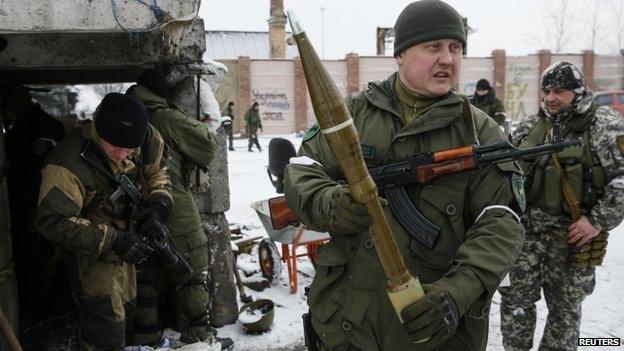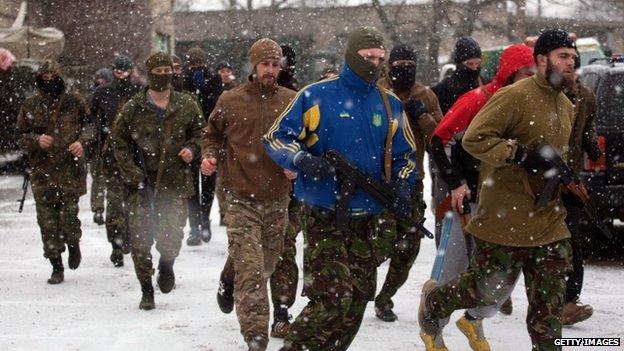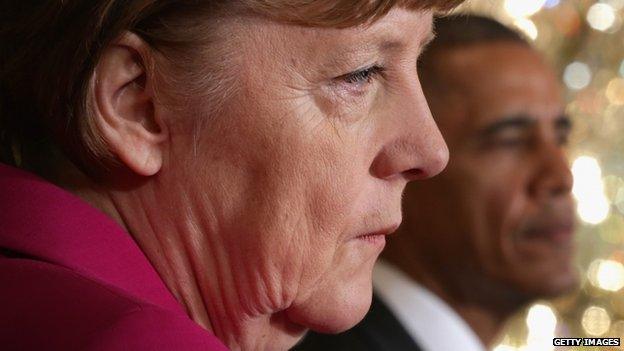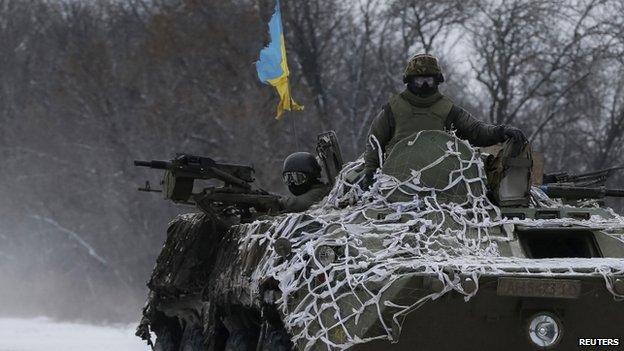Does the West have the will to stop Russia?
- Published

Russian-backed rebels appear well armed
It is not Vegas, but the worry must be that what happens in Minsk, stays in Minsk.
The urgency of making sure a ceasefire happens, and holds will only serve to intensify the debate in the US about how to deal with Vladimir Putin.
President to president, Barack Obama has told, external Putin "the cost will rise" if Russia continues its aggression in Ukraine. But he hasn't spelt out what that means.
And that matters a lot.
The Washington debate over arming, external Ukraine cuts to the conundrum at the heart of President Obama's foreign policy, external.
It is smart, it is strategic - and it isn't working.
President Obama says "a decision has not yet been made" whether to beef up, external Ukraine's military with advanced US weapons. But he has said it is a possibility.
He said it at a joint news conference with Germany's Angela Merkel. She is against it, external. So is France, and the UK, external. They are warning against making a bad situation worse, external.
Few think that even top-notch weapons would mean the Ukrainian army could actually beat , externalthe rebels and the Russians (who say they are not there) - the idea is to level the playing field and give President Putin pause for thought.
One report, external demanding urgent action from the president concludes: "The West has the capacity to stop Russia. The question is whether it has the will."
That points to an even more important philosophical debate that no-one is having at the moment.
The Brookings document, authored by some pretty impressive people, concludes chillingly that if the West doesn't display that resolve, Moscow will take note.
"History makes clear that the only way to stop such aggression from precipitating a regional or even world-wide conflagration is to deter and defend against it," it says.
One of the authors, former US ambassador John Herbst, told me: "There has to be some push back on the ground so Mr Putin understands that a diplomatic solution is in his interests too. His statements against the Baltic states show his goals are greater than Ukraine."
He added: "The most important national security challenge in the world today is a rogue Kremlin and we need to stop him, and Ukraine is the place to do it."
Broadly, the Pentagon and US State Department agree with this assessment, whereas President Obama and his national security adviser, Susan Rice, are far more hesitant.
'Strategic patience'
In the midst of this intense practical debate, comes the theory.
Ms Rice has published, external a once-every-five-years overview of President Obama's foreign policy.

Volunteers are swelling the ranks of Ukrainian militias
It hasn't got much coverage, external - but that is the point.
In the face of a fast changing, hostile, intractable world, this report is serene to the point of smugness.
The doctrine it sets out is called "strategic patience", external.
Susan Rice warns against being distracted by day-to-day headlines and media clamour.
Instead, she says: "We are committed to seizing the future that lies beyond the crisis of the day and pursuing a vision of the world as it can and should be."
There is a lot of sense in this. She is right that the US doesn't face any threat to its very existence. She is right that India is of growing importance, and the relationship with China is the key to the future.
It is right that the door to co-operation with Russia should be kept open, external.
The danger is that the bright future she outlines could slip through Ms Rice's fingers if someone else seizes the crisis of the present with a firmer grasp.
Not that she isn't outraged at Russia's actions.
She says: "Russian's aggression against Ukraine is a heinous and deadly affront to longstanding norms.
"We have built a coalition of partners to impose steep political and economic costs, and we will continue to turn up the pressure unless Russia decisively reverses course."
Zen-like approach
That pressure comes in the form of sanctions, which are indeed hurting Russia a lot. But while the tactic is clear, the strategy is not defined.

Chancellor Merkel has urged caution
The desire to give the bear a smack on the snout is understandable.
But it is not set out whether the economic pain is meant to put President Putin under such pressure he withdraws from Crimea or re-considers his future options, or whether its purpose is to drive him from office.
On Capitol Hill - and the think tanks where academics move smoothly from analysis to power - there is obvious frustration at this Zen foreign policy.
The Brookings document, with its very tough wording, is not just any old think tank report.
It is signed by three former senior officials at the Pentagon or State Department, two former US ambassadors to Ukraine, a former US ambassador to Nato and the former supreme commander of allied forces in Europe.
They are people not just with a past, but with a future. Insiders say several of them will form the nucleus of Hillary Clinton's foreign affairs team, if and when she runs for president.
The report urges the president immediately to spend £1bn giving military assistance, drones, armour piercing missiles and beefed up air defences to Ukraine.
John Herbst is very far from those hawks who are restless unless the US is at war. But he says, this time, the president has missed the point of sending arms.
"Most of the US government thinks this is a good idea," he says.
"The president is cautious, and I partly understand that.
"He inherited a hyper-interventionist and profoundly failed foreign policy.
"The previous administration's adventures were a serious set back for this country.
"The president, against his own instincts, was persuaded by his advisers to go into Libya. And that produced disaster.
"And the President realised that when those same advisers wanted him to get involved in Syria. He said, "No". And he was wise, and I praised him.
"The problem is he's applying that logic to a very different situation.
"The reason why it was a disaster to go into Libya, the reason why it would be a disaster to arm the rebels in Syria is that there are no people who are both competent and share our values.
"In Ukraine it is very different - you have a competent leadership who want to move in the direction of democracy and market economy. And they are being stamped out by an authoritarian aggressor."
Understandable caution
One former insider, Sean Brimley, director of strategic planning on the president's national security council 2009-12, understands the caution and the questions.
He says: "What exactly are we going to give them? Are we going to train them? Do they need US advisers on the ground to help them deploy these weapons?
"Anti-tank munitions aren't just 'fire and forget' sort of things, they are highly complex, advanced munitions and require training.
"How long is it going to take them to get there? How long will it take to train up on them? Is that going to make a meaningful difference on the ground? What's the timeline?
"These are the sorts of things I know the White House are planning for. They are doing their job, asking these questions before we get ourselves into this conflict in a much more overt manner."
Minsk 2 may be a genuine peace treaty or another way of establishing what is called in the annoying jargon, a "frozen conflict."
But the adjective it is apt.

Ukraine's war: The human cost
5,486 people people killed and 12,972 wounded in eastern Ukraine
Fatalities include 298 people on Malaysia Airlines flight MH17 shot down on 17 July
5.2 million people estimated to be living in conflict areas
978,482 internally displaced people, including 119,832 children
600,000 fled to neighbouring countries, of whom more than 400,000 have gone to Russia
Source: Figures from UN report, 6 February, external

Earnest diplomatic efforts and stalemate on the ground tend to halt the Russian advances, external (think Georgia) for a while.
Unlike supermarket vegetables, conflicts do not have a star system - telling you how long they will last in the deep freeze.
For, at any time, the application of a little military heat can soon liquefy the conflict and the pro-Russian forces flow forward.
Then there is another flurry of well-meaning diplomacy, a truce of sorts, and the conflict is once again frozen.
In the meantime, the Kremlin's forces have edged further forward, the glacier has advanced.
Fundamental issues
All this is important because Ukraine is about first principles: how the West sees itself, how the US behaves in the world.

Violence in eastern Ukraine has escalated
There is a clash between two very sensible diplomatic instincts.
First, an understanding the Western alliance is not the only power in the world and respect and empathy for those who could easily become the enemy.
Against that, a belief that the West's values are universal, and democracy and self-determination are the right of all.
A basic understanding of recent history should mean we understand that many people who grew up in the Soviet Union feel Russia has been cauterised and amputated: that now Nato and the European Union are knocking on their back door, claiming even Ukraine, external - the birthplace of their state and their religion.
That they feel, not the aggressors, but under attack.
But it is also right to show empathy for Ukrainians who feel they have a European destiny.
They want to join the European Union and will even risk their lives for that right and the democratic values and free market economy that come with it.
It is rather ironic, given the debate about EU membership in the UK - although I don't think any one is suggesting we join the Russian empire as an alternative.
But this is the conundrum that President Obama cannot answer - and which lies behind his hesitation.